
 Flash News
Flash News
Korça/ 40-year-old man jumps from fifth floor balcony, in critical condition
Croatia restores compulsory military service
Illegal constructions in Theth, Manja demands disciplinary proceedings against prosecutor Elsa Gjeli
Details from the murder of Renis Dobra, the perpetrators came with 2 Range Rover cars from Rrëshen
The Supreme Court left him in prison, Meta addresses the 'Constitution'
Concern grows over deepening cooperation between Beijing, Moscow, Pyongyang and Tehran

Washington's most dangerous adversaries are deepening cooperation among themselves, but analysts from American intelligence agencies believe that for now, they have failed to form a close alliance that can more effectively confront the United States.
Concerns from the United States and its allies about growing cooperation between Russia, China, Iran, and North Korea have been steadily growing since Moscow launched a large-scale attack on Ukraine in February 2022. The concerns are based on intelligence sources indicating that Beijing, Tehran, and Pyongyang are assisting Russia with technology, missiles, drones, and even troops in the war against Ukraine.
The former commander of US forces in the Indo-Pacific earlier this year even called the growing ties between four enemy countries of the United States a "naval axis of evil."
However, American intelligence officials believe that the axis is, in some way, blocked by its own shortcomings.
"They are not acting as a bloc," said Director of National Intelligence Avril Haines, speaking Thursday in Washington at a discussion hosted by the Council on Foreign Relations.
"We don't see them as some kind of quadripartite alliance," she said. "We don't see them as allies, operating in a similar way to NATO countries. They don't have that level of military interaction and cooperation."
However, they see the axis as a concern on several fronts.
Ms Haines said that increased cooperation between Russia, China, Iran and North Korea has contributed to a further erosion of international norms around weapons of mass destruction.
In areas where Russia and China were once willing to cooperate with the United States and the West, such as stopping the spread of nuclear weapons, Moscow and Beijing now seem more inclined to grant Iran and North Korea additional leeway.
"This is happening largely because Russia is now to some extent dependent on North Korea and Iran for advanced weapons, ammunition and other means for the war with Ukraine," Ms. Haines said.
"They are less likely to back down," she said. "And certainly, we have observed the degree to which they actually, for example, accept North Korea as a nuclear power."
Haines said increased cooperation between Russia, China, Iran and North Korea has helped all four countries evade Western sanctions.
She said there are even some signals that Russia is willing to take actions that would allow Beijing to surpass the United States in some critical areas.
"They are willing to potentially help China more, by giving them technology that could actually make China advance faster in other areas that are of concern to us," Ms. Haines said.
Washington's NATO allies have issued similar warnings in recent months, with several NATO officials telling VOA that the axis of these countries has already laid the foundations for a new global arms race.
Russia's sabotage
There are also ongoing concerns about the willingness of Russia, China, Iran and North Korea to engage in so-called covert activity.
A declassified report by US intelligence agencies, published in July, warned that in the next five to six years "there are likely to be more frequent, diverse and damaging acts of blackmail, particularly by China, Iran, Russia and North Korea, under what amounts to armed conflict but outside the bounds of historically legitimate state action."
Director of National Intelligence Avril Haines said Thursday that these types of activities by Russia, including sabotage efforts in Europe, have "increased at all levels."
"Russia has just invested money, personnel, tremendous effort in this area and will continue to do so," she said. "While we have made improvements in preventing some of this activity, we are not at the point where we feel comfortable."
Change of administration in the US
US intelligence analysts are closely watching how other countries are behaving as Washington prepares for President-elect Donald Trump to take office in January.
"There are several actors who are trying to prepare for new positions during the next administration," Ms. Haines said.
She said that intelligence agencies are preparing reports on these activities, which they will share with the incoming Trump administration, and are also closely monitoring the possibility of escalating tensions from some countries during the transition period.
"For example, North Korea typically engages in some provocative actions during periods of power transition," Ms. Haines said. "That's one of the classic things that we're constantly watching."/ VOA
Latest news


Malltezi: SPAK admits, we are in a process that began with Balla's false report
2025-07-10 22:34:16

Si të çliroheni nga bllokimet emocionale me anë të ushtrimeve
2025-07-10 21:57:24

Lala: Veliaj wanted to return as mayor
2025-07-10 21:40:46

VIDEO/ Brawl in Bolivian parliament, deputies physically clash
2025-07-10 21:20:30


Albania experienced one of the longest heat waves of the last decade
2025-07-10 21:01:09

The Government approves new procedures for declaring residence in e-Albania
2025-07-10 20:39:32

Koka: Northerners will not forget Edi Rama's racist operation in Theth
2025-07-10 20:18:24
The 3 zodiac signs that will be most affected by the 'Full Moon' of July 10
2025-07-10 20:04:49
New director of the National Center of Cinematography appointed
2025-07-10 19:51:12
Korça/ 40-year-old man jumps from fifth floor balcony, in critical condition
2025-07-10 19:40:19
'Tired Woman'/ The Syndrome That Affects Thousands of Women Every Day
2025-07-10 19:34:02
Jane Birkin's original Hermès bag sells for $10 million
2025-07-10 19:26:22

Britain-Ukraine agreement signed for 5,000 Thales missiles
2025-07-10 19:00:25
Fire in Zvërnec, flames endanger two hotels
2025-07-10 18:57:19
Croatia restores compulsory military service
2025-07-10 18:39:01
Spahia: The great truth of the strong accusation of the residents of Theth
2025-07-10 18:35:07


The Supreme Court left him in prison, Meta addresses the 'Constitution'
2025-07-10 17:57:21
New punishment with 'new' regulations
2025-07-10 17:54:46
EU translator fired over fears for Zelenskyy's safety
2025-07-10 17:45:37
'You are a policeman, but not God, take my soul', protest for Agon Zejnullahu
2025-07-10 17:41:21


Video/ Rama repeats the scenario, kneels before Meloni again
2025-07-10 16:56:31
He set fire to a plot of olive trees, 50-year-old man arrested in Shijak
2025-07-10 16:46:19

Rubio: US and Russia have exchanged new ideas for Ukraine peace talks
2025-07-10 16:36:20
Death of 27-year-old, Lipjan Police Commander Resigns
2025-07-10 16:21:28
Video/ An apartment burns in Tirana near the New Bazaar
2025-07-10 16:09:36


Jensila lights up the internet with her birthday greetings to Ledri
2025-07-10 15:42:08
They're full of pesticides! List of 12 products we need to be careful of
2025-07-10 15:31:04

Worker falls from scaffolding in Shëngjin, urgently sent to Trauma
2025-07-10 15:11:03
Malltezi: Within one day they seized my accounts, properties and shares
2025-07-10 15:01:23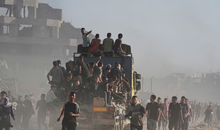
EU: Israel has agreed to more aid to Gaza
2025-07-10 14:55:19


Murder of Reni Dobra, 23-year-old's vehicle pulled from the water
2025-07-10 14:29:23
Trump's tariffs on Brazil raise coffee prices
2025-07-10 14:16:07
Ursula von der Leyen survives no-confidence vote
2025-07-10 14:04:27

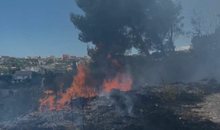
Fire in Lezha, flames near electrical substation
2025-07-10 13:32:24
Residents clash with police in Theth, a woman faints
2025-07-10 13:24:38
"Rama and Xanun"
2025-07-10 13:15:46

Zodiac signs most likely to get divorced in July 2025
2025-07-10 12:45:51
A scapegoat for an illegitimate Republic
2025-07-10 12:35:02
"He has devastated his own nation"/ Berisha: Rama imprisons his opponents!
2025-07-10 12:26:54

Albanian man injured with knife in Italy
2025-07-10 12:08:55






23-year-old in Mat drowned with rope, 4 suspects are being held
2025-07-10 10:58:53
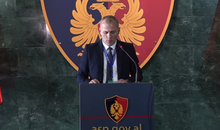
After the dismissals, the new director of the Shkodra Police is appointed
2025-07-10 10:30:10
BIRN: Rama's action for public spaces, a repeated spectacle
2025-07-10 10:29:11
Action in Theth, Shkodra Police leaders dismissed
2025-07-10 10:16:28
Fatal accident on the Tirana-Durres highway
2025-07-10 10:01:58
The incinerator does not exist, but the government continues to increase funds
2025-07-10 09:51:45
Albania is aging at a rapid pace! 30% of the population is over 60 years old
2025-07-10 09:46:23
End of an era, Modric says 'goodbye' to Real Madrid
2025-07-10 09:36:09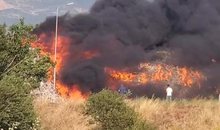
Mount Dukat has been on fire for 6 days, residents request air intervention
2025-07-10 09:27:24

"Poverty on the rise"/ DW: Many people in Germany are not getting paid
2025-07-10 09:08:06
Horoscope, what do the stars have in store for you today?
2025-07-10 08:51:59

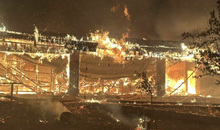


The scorching heat returns, the thermometer climbs to 40°C
2025-07-10 07:58:52
Morning Post/ In 2 lines: What mattered yesterday in Albania
2025-07-10 07:46:35
Tourist operator in Theth: They are demolishing our houses without warning
2025-07-09 22:54:57
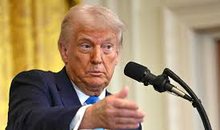
Trump and Israeli commander warn: Gaza ceasefire could be near
2025-07-09 22:13:21
Fire in Elbasan Landfill, pedagogue: It is a cancer and environmental crime
2025-07-09 21:54:47


Dangerous summer, number of snake bites increases
2025-07-09 21:22:13
Berisha appeals again: Stop state terror against the residents of Theth!
2025-07-09 21:15:36
'Kissing disease' virus linked to several forms of cancer
2025-07-09 21:04:44
Malltezi confesses after release: Justice has become a political weapon
2025-07-09 20:51:48
Vokshi: Albania's EU integration has stalled due to lack of free elections
2025-07-09 20:37:21
